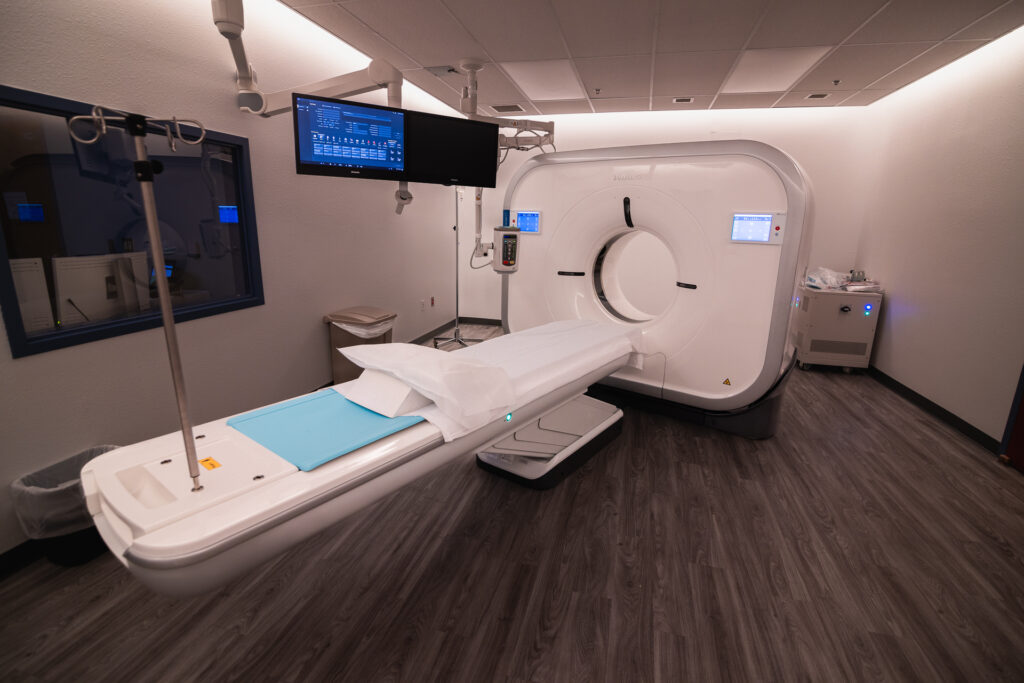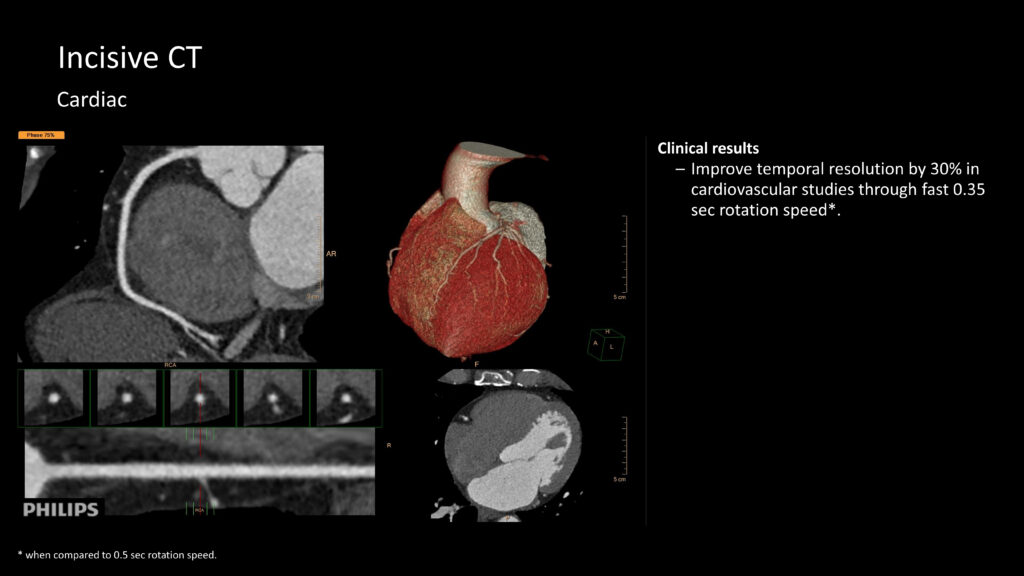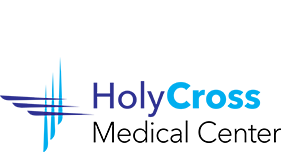Holy Cross Hospital made a substantial upgrade last year with the addition of a state-of-the-art Philips Incisive CT Scanner to the hospital’s Imaging Department. The Incisive CT Scanner offers excellent imaging capabilities allowing patients to get advanced diagnostic procedures right here in Taos.
This CT scanner is an example of our ongoing commitment to the health of our community. Having a machine of this caliber in Taos means that our doctors and local practitioners can offer patients a noninvasive diagnostic option and know that they are going to get high quality images without having to leave Taos.”
– James Kiser, CEO Holy Cross Medical Center
According to Philips, one of the standout features of the Philips Incisive CT Scanner is its advanced image quality, which allows for detailed and precise scans. Equipped with the latest innovations in imaging technology this scanner delivers exceptional image clarity while minimizing radiation exposure for patients. This means that healthcare professionals in Taos can now obtain clearer and more accurate images, supporting more reliable diagnoses and better patient outcomes.
The Philips Incisive CT Scanner boasts remarkable speed and efficiency, enabling healthcare practitioners to perform scans quickly and seamlessly, reducing wait times for patients, and improving overall operational efficiency at the hospital. This translates to a better experience for patients and better utilization of resources, ultimately benefiting both patients and practitioners alike.
The old scanner obtained 64 slices at a time, this new one captures 128 which means you acquire data twice as fast. The speed and your ability to acquire data results in better images, which can lead to faster diagnosis.“
– Dr. Peter Selzer, Diagnostic Radiologist
The Incisive CT Scanner offers a wide range of clinical applications, making it a versatile tool for diagnosing various medical conditions. Whether it’s detecting injuries, assessing internal organs, or evaluating the progression of diseases, this state-of-the-art scanner empowers local healthcare practitioners to address a diverse array of patient needs with confidence and precision.

When it comes to supporting heart health and diagnosing cardiac disease, CT is a fundamental imaging method. Last year, Holy Cross Medical Center expanded Cardiology services by welcoming Dr. Tiziano Scarabelli and his wife Carol Chen-Scarabelli to the team. By offering the incisive CT machine at Holy Cross Hospital, Dr. Scarabelli and his team are able to better assess and diagnose the heart health of patients right here in Taos. The incisive CT machine provides necessary temporal resolution for a coronary exam due to its very fast rotation speed.
How CT is Used in Cardiology
The coronary calcium score (CCS) and coronary CT angiogram (CCTA) are two important heart tests that can help us understand the heart health of our patients.
The coronary calcium score, in simple terms, shows us how much calcium is in the heart’s arteries, called coronary arteries. The finding of calcium in the coronary arteries means only one thing: presence of hardened plaque that can cause narrowing of the coronary arteries, limiting the flow of oxygen-rich blood to the heart. The bigger the coronary calcium score, the greater the risk of heart-related issues. Many research studies have shown a direct link between a high coronary calcium score and the likelihood of future heart problems. This score has an invaluable prognostic value, helping us predict heart attacks, strokes, and sudden cardiac death. It is like a crystal ball giving us a glimpse into the future of our patient’s heart.
On the other hand, a coronary CT angiogram is a powerful tool for diagnosis. It’s like a high-definition TV for the heart, providing detailed, 3D images of the heart and its blood vessels. These images allow us to closely examine the heart from all angles and see things we can’t see with other tests. The main role of a coronary CT angiogram is to diagnose heart conditions, particularly coronary artery disease. This is a condition where plaque, a substance made of fat, cholesterol, and other elements, builds up in the heart’s arteries. This build-up can narrow or block the arteries, reducing blood flow to the heart, and potentially leading to a heart attack. The CCTA lets us see these plaques and blockages, and even measure their size, explaining for instance whether the chest pain experienced by our patients is truly coming from the heart. In addition, a coronary CT angiogram can help diagnose other heart conditions, such as congenital heart defects, problems with the aorta, or issues with the heart valves. So in essence, a CCTA helps us to solve the mystery of what’s happening inside our patient’s heart, helping us decide what is the best treatment plan.
A coronary CT angiogram is more powerful than any other tests, such as nuclear stress tests and stress echocardiograms. In fact, the latest recommendations give the highest endorsement (class Ia) for the use of coronary CT angiogram in patients with chest pain, while treadmill stress test, nuclear stress test and stress echocardiogram have a slightly lower endorsement (class Ib).

So, by using these two tests, we can not only predict potential heart problems but also diagnose them accurately and early, which is particularly beneficial for our rural community where access to advanced healthcare may be limited. Excerpt written by Dr. Tiziano Scarabelli, Cardiologist at Holy Cross Cardiology
The Philips Incisive CT Scanner is designed with patient comfort and safety in mind. Featuring innovative technologies such as Ambient Experience and VitalEye, the scanner enhances the patient experience by creating a soothing and reassuring environment during scans. Its low-dose imaging capabilities prioritize patient safety by minimizing radiation exposure without compromising image quality, ensuring that patients receive the highest standard of care throughout their diagnostic journey.
The upgrade to the Philips Incisive CT Scanner represents a significant leap forward for Holy Cross and local health care practitioners. With its excellent imaging capabilities, speed, efficiency, and commitment to patient safety and comfort, this scanner is poised to meet the needs of diagnostic procedures and elevate the standard of care for patients in the region. As Holy Cross Hospital embraces constantly evolving healthcare technology, the community can access some of the very best in medical imaging services right in their own backyard.
Referrals are needed for CT scans. Just know that if you are in need of a CT Scan, there is a high quality option right here in Taos.
